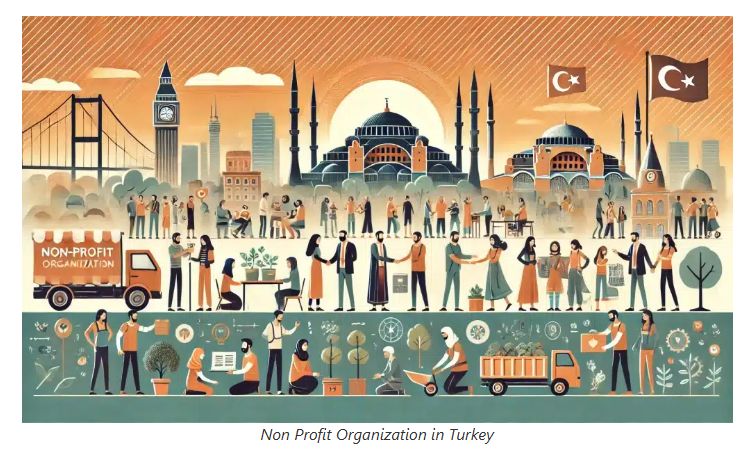- within Corporate/Commercial Law topic(s)
- in Turkey
- in Turkey
- within Finance and Banking, Energy and Natural Resources and Accounting and Audit topic(s)
What is a Non Profit Organization in Turkey?
A Non-Profit Organization (NPO) in Turkey is an entity established to serve public, social, or humanitarian interests without seeking financial gain. These organizations reinvest all income into their missions rather than distributing profits to members.

Types of Non-Profit Organizations in Turkey
Turkey recognizes several types of Non-Profit Organizations (NPOs), each serving different purposes and operating under specific regulations. The main types include:
1. Associations (Dernekler)
- Formed by at least seven people with a common goal.
- Can engage in social, cultural, educational, and humanitarian activities.
- Governed by the Turkish Civil Code and regulated by the Directorate of Associations.
- Foreigners may be founders
- Examples: Human rights groups, sports clubs, and cultural organizations.
2. Foundations (Vakıflar)
- Established by individuals or entities with dedicated assets for public benefit.
- Foreigners may be founders.
- Require a minimum assets of 500,000 TRY.(about 13,160 EUR)
- Regulated by the General Directorate of Foundations.
- Examples: Charities, scholarship funds, and healthcare foundations.
3. Public Benefit Organizations (Kamu Yararına Çalışan Dernekler & Vakıflar)
- Special status granted to associations or foundations that significantly contribute to public welfare.
- Eligible for tax exemptions and government support.
- Must meet strict financial transparency and reporting requirements.
4. Cooperatives (Kooperatifler)
- Member-owned organizations that focus on economic and social development.
- Operate in agriculture, housing, education, and trade.
- Governed by the Cooperatives Law and supervised by the Ministry of Trade.
5. International NGOs (Uluslararası STK'lar)
- Foreign-based non-profits operating in Turkey.
- Must obtain government approval and register with the Ministry of Interior.
- Often involved in humanitarian aid, refugee assistance, and development projects.
Each type of non-profit organization in Turkey serves a unique role, contributing to social progress and development.
Legal Framework for Non-Profits in Turkey
Non-Profit Organizations (NPOs) in Turkey operate under a structured legal framework to ensure transparency, accountability, and compliance with national regulations. The key laws and regulatory bodies governing NPOs include:
Turkish Civil Code (Türk Medeni Kanunu)
- The primary law governing associations (dernekler) and foundations (vakıflar).
- Defines establishment procedures, operational rules, and dissolution processes.
Law on Associations (Dernekler Kanunu, No. 5253)
- Regulates the formation, operation, and supervision of associations.
- Requires associations to register with the Directorate of Associations and submit annual financial reports.
Foundations Law (Vakıflar Kanunu, No. 5737)
- Governs the establishment and administration of foundations.
- Managed by the General Directorate of Foundations (Vakıflar Genel Müdürlüğü).
- Foundations must operate for public benefit and adhere to strict financial reporting.
International NGO Regulations
- Foreign non-profits must obtain approval from the Ministry of Interior before operating in Turkey.
- Required to submit annual reports and comply with national laws regarding funding and activities.
Tax & Financial Regulations for NPOs
- Certain non-profits can apply for tax-exempt status if they meet public benefit criteria.
- Financial activities are monitored by the Ministry of Treasury and Finance to ensure compliance.
Turkey maintains a strict but structured legal framework for non-profits, ensuring transparency and accountability while allowing organizations to serve the public effectively.
How to Register a Non-Profit Organization in Turkey
Establishing a Non-Profit Organization (NPO) in Turkey involves several legal steps, depending on whether you are setting up an association (dernek) or a foundation (vakıf). Below is a step-by-step guide to registering an NPO in Turkey.
1. Choose the Type of Non-Profit Organization
Before starting the registration process, decide whether you
want to establish:
✅ An Association (Dernek) – Requires
at least 7 founding members and is easier to set
up.
✅ A Foundation (Vakıf) – Requires
an assets of 500,000 TRY and legal approval.
2. Prepare the Necessary Documents
- For Associations (Dernekler):
- Articles of Association (Bylaws) – Defines the purpose, structure, and rules of the organization.
- Founding Members' IDs & Address Proof – At least seven Turkish or foreign individuals or corporates
- Official Application Form – Submitted to the Provincial Directorate of Associations.
- For Foundations (Vakıflar):
- Foundation Charter (Vakıf Senedi) – Notarized document outlining the organization's purpose and assets.
- Assets Proof – Minimum 500,000 TRY in assets for public-benefit foundations.
- Founders' Identification Documents – Can be individuals or legal entities.
- Registration Application – Submitted to the General Directorate of Foundations.
3. Submit the Application
- Associations apply to the Provincial Directorate of Associations in the city where they will operate.
- Foundations submit their application to the General Directorate of Foundations for approval.
After submission, the relevant authorities review the application, ensuring compliance with Turkish laws.
4. Obtain Legal Status
Once the application is approved, the organization
receives:
✅ Official Registration Certificate –
Confirms the organization's legal status.
✅ Tax Identification Number – Required
for financial transactions.
✅ Bank Account Opening Permission –
Allows the organization to receive donations and grants.
Compliance & Reporting Requirements for NPOs in Turkey
Once a Non-Profit Organization (NPO) is registered in Turkey, it must comply with specific legal and financial regulations to ensure transparency, accountability, and lawful operations. Below are the key compliance and reporting requirements for Associations (Dernekler) and Foundations (Vakıflar) in Turkey.
- Financial Reporting
- Associations must submit an Annual Activity Report and a Financial Statement to the Provincial Directorate of Associations.
- Foundations must report their annual activities to the General Directorate of Foundations.to the General Directorate of Foundations.
- Tax Compliance & Exemptions
- NPOs which is conducting commercial activities must declare their revenues and expenses with tax return to the Ministry of Treasury and Finance.
- NPOs which hires any emloyee must declare theirs & emloyess social security contrubutions to the Social Security Institution .
- Certain Public Benefit Foundations and Associations can apply for tax-exempt status to receive donation incentives and corporate tax exemptions.
- All foreign donations must be reported to the Ministry of Interior for transparency.
- Fundraising & Donation Regulations
- Public Fundraising (Bağış ve Yardım Toplama Kanunu) requires official permission from the local governor's office.
- All donation records must be documented and disclosed in financial reports.
- Membership & Governance Regulations
- Associations must hold General Assembly meetings at least once every three years.
- Any changes in bylaws, board members, or operational structure must be reported to the relevant government authority.
- Inspections & Audits
- Turkish authorities can conduct regular audits to ensure compliance with financial and operational laws.
- Non-compliance can result in fines, revocation of legal status, or criminal charges.
Fundraising & Donations for Non-Profits in Turkey
Non-Profit Organizations (NPOs) in Turkey rely on fundraising and donations to sustain their activities. However, strict legal regulations govern how NPOs can collect funds, especially for public donations. Below is a guide on legal methods, regulations, and best practices for fundraising in Turkey.
1. Legal Ways to Fundraise in Turkey
✅ Membership Fees – Associations
can collect annual membership dues to support
activities.
✅ Private Donations – Individuals and
corporations can donate directly to registered NPOs.
✅ Corporate Sponsorships – Businesses
can support non-profits in exchange for social responsibility
contributions.
✅ Fundraising Events – NPOs can
organize charity auctions, concerts, and galas to
raise funds.
✅ Government Grants & Subsidies –
Some NPOs qualify for financial aid from local and national
governments.
✅ International Grants & Partnerships
– NGOs can receive funding from global
organizations like the UN, EU, or private foundations.
2. Public Fundraising Regulations
📌 Permission Required for Public
Donations – NPOs must get approval from the
local governor's office to conduct public
fundraising.
📌 Transparent Financial Reporting –
All donations must be documented, reported, and
disclosed in annual reports.
📌 Foreign Donations & Aid –
International funding must be reported to the Ministry of
Interior.
🚨 Failure to comply with donation laws can result in fines or legal action.
3. Best Practices for Successful Fundraising
✔️ Use Online Fundraising
Platforms – Digital campaigns via social media and
crowdfunding sites can attract donors.
✔️ Engage Corporate Sponsors –
Partnering with businesses can ensure long-term financial
sustainability.
✔️ Offer Tax Benefits to Donors
– If an NPO has public benefit status,
donors can receive tax deductions.
✔️ Show Transparency – Publish
donor reports and success stories to gain trust
and encourage more contributions.
Challenges Faced by Non-Profits in Turkey
Non-Profit Organizations (NPOs) in Turkey play a crucial role in social development, but they face several challenges that affect their sustainability and operations. Below are some of the key legal, financial, and operational challenges NPOs encounter in Turkey.
1. Legal & Regulatory Challenges
📌 Strict Government Regulations –
NPOs must comply with complex legal frameworks and
regularly report activities.
📌 Fundraising Restrictions – Public
donations require official permission from the
local governor's office.
📌 Foreign Funding Scrutiny –
International donations are closely monitored by the Ministry of
Interior, making it harder to receive external support.
📌 Lengthy Registration Process –
Establishing a foundation requires a minimum of 500,000 TRY and
approval from the General Directorate of Foundations.
2. Financial Challenges
📌 Limited Access to Funding –
Many NPOs struggle to secure government grants, corporate
sponsorships, or sustainable revenue streams.
📌 Taxation Issues – Only NPOs with
public benefit status receive tax exemptions, making it harder for
smaller organizations to thrive.
📌 Economic Instability – Fluctuating
currency and inflation rates impact donation levels and operational
costs.
3. Public Awareness & Trust Issues
📌 Lack of Awareness – Many people
are unfamiliar with non-profit operations, reducing potential
membership and volunteer engagement.
📌 Donor Skepticism – Transparency
issues in some organizations create distrust, discouraging
corporate and individual donations.
4. Operational & Administrative Challenges
📌 Bureaucratic Barriers –
Frequent audits, compliance checks, and reporting requirements
increase administrative burdens.
📌 Lack of Skilled Workforce – Many
NPOs struggle to recruit and retain experienced staff and
volunteers.
📌 Limited Digital Adoption – Some
non-profits lack the technology or knowledge to implement effective
online fundraising and marketing strategies.
5. Political & Social Challenges
📌 Political Sensitivities – Some
NPOs, especially those working in human rights and advocacy, face
restrictions or government intervention.
📌 Limited Media Coverage –
Non-profit activities receive minimal mainstream media attention,
making outreach difficult.
The content of this article is intended to provide a general guide to the subject matter. Specialist advice should be sought about your specific circumstances.


